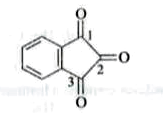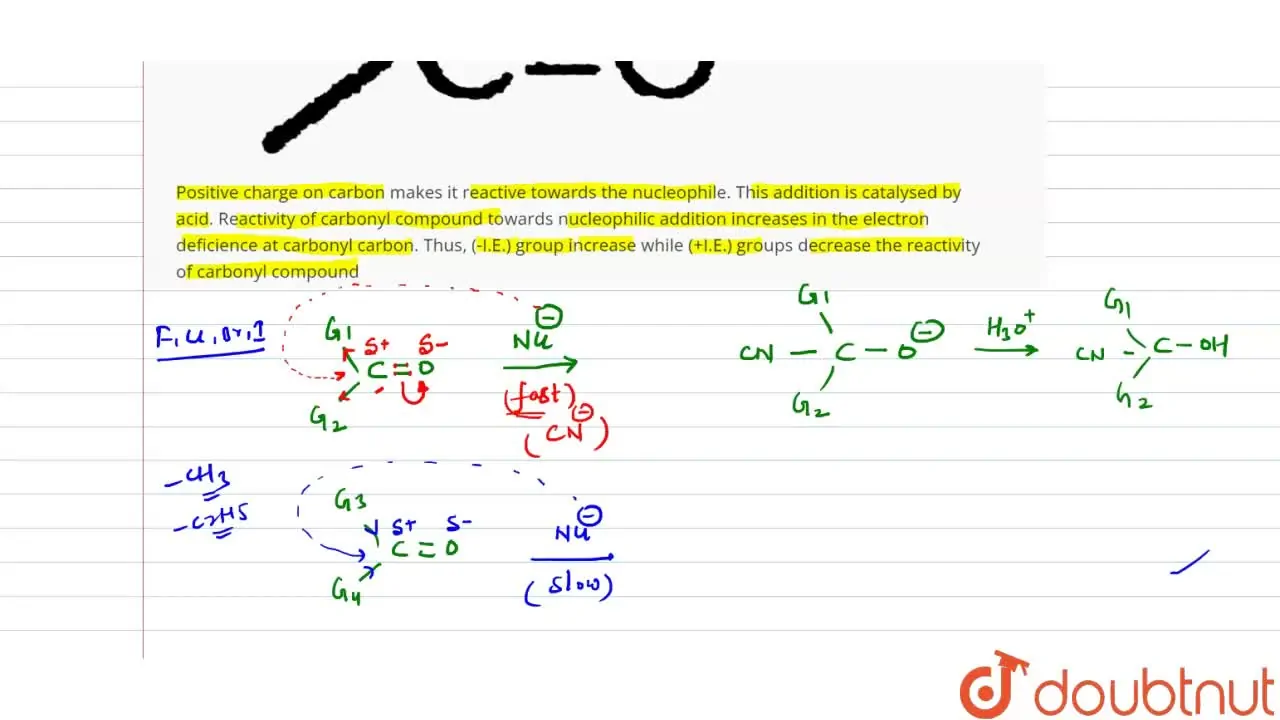Aldehyde and ketones are specially susceptible susceptible to nucleophile addition because carbonyl group _E01_582_Q01.png) (due to electronegatvity different between carbon and oxygen).
(due to electronegatvity different between carbon and oxygen).
_E01_582_Q02.png)
Positive charge on carbon makes it reactive towards the nucleophile. This addition is catalysed by acid. Reactivity of carbonyl compound towards nucleophilic addition increases in the electron deficience at carbonyl carbon. Thus, (-I.E.) group increase while (+I.E.) groups decrease the reactivity of carbonyl compound
The correct Answer is:A
Step by step video & image solution for Aldehyde and ketones are specially susceptible susceptible to nucleophile addition because carbonyl group (due to electronegatvity different between carbon and oxygen). Positive charge on carbon makes it reactive towards the nucleophile. This addition is catalysed by acid. Reactivity of carbonyl compound towards nucleophilic addition increases in the electron deficience at carbonyl carbon. Thus, (-I.E.) group increase while (+I.E.) groups decrease the reactivity of carbonyl compound by Chemistry experts to help you in doubts & scoring excellent marks in Class 12 exams.
Related Playlists
- BOOK - ALLENCHAPTER - ALKENE, ALKANE & ALKYNE EXERCISE - EXERCISE-4(A)10videos
ALKENE, ALKANE & ALKYNE
- BOOK - ALLENCHAPTER - ALKENE, ALKANE & ALKYNE EXERCISE - EXERCISE-4(B)10videos
ALKENE, ALKANE & ALKYNE
- BOOK - ALLENCHAPTER - ALKENE, ALKANE & ALKYNE EXERCISE - EXERCISE-2103videos
ALKENE, ALKANE & ALKYNE
- BOOK - ALLENCHAPTER - AIIMS 2019EXERCISE - CHEMISTRY40videos
AIIMS 2019
- BOOK - ALLENCHAPTER - ALKYL AND ARYL HALIDEEXERCISE - EXERCISE-05 (B)35videos
ALKYL AND ARYL HALIDE
Similar Questions
The order of reactivity of carbonyl compounds for nucleophilic addition is
View SolutionThe reactivity of carbonyl compounds towards nucleophilic addition reaction gets affected by
View SolutionDiscuss the relative reactivities of carbonyl compounds in nucleophilic addition reactions.
View SolutionAssertion : Acetone is less reactive towards nucleophilic addition than acetaldehyde.
Reason : The alkyl groups hinder the nucleophilic attack on carbonyl carbon atom.View SolutionAssertion : Carbonyl compounds take part in nucleophilic addition reactions.
Reason : These reactions are initiated by nucleophilic attack at the electron deficient carbon atom.View SolutionWhich carbonyl group of the given compound is most reactive for nucleophilic addition reaction?
 View Solution
View SolutionA : Aldehydes and ketones undergo nucleophilic addition reaction.
R : Aldehydes and ketones contain carbonyl group.View SolutionCarboxylic acids contain carbonyl group but do not show the nucleophilic addition reactions like aldehydes or ketones. Why?
View SolutionThe correct order of reactivity for the nucleophilic addition reaction of the following carbonyl compounds with ethyl magnesium iodide is :
 View Solution
View SolutionAssertion : Acetaldehyde is more reactive than acetone in nucleophilic addition reactions.
Reason Two alkyl groups in acetone reduce the electrophilicity of the carbon.View Solution


